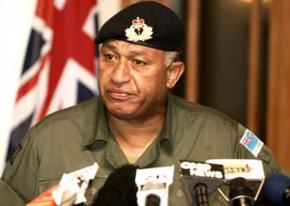A round up of current development policy issues in the Pacific, by the Pacific Institute of Public Policy and the Development Policy Centre.
Fiji to start work on voter registration and a new constitution
The military government in Fiji has signaled its intention to hold to its 2014 ‘democracy roadmap’, with reports suggesting voter registration in the country will commence in January 2012, to be completed in July. Speaking at an event hosted by the Citizens’ Constitutional Forum, interim attorney general Aiyaz Sayed-Khaiyum has promised an end to the public emergency regulations (that have been in place since April 2009) once work commences on the new constitution, expected in September next year. The emergency regulations have outlawed many activities, including a free press and freedom to assemble.
This comes at the same time as allegations by Australia’s peak union body that Fiji has targeted unions following the arrest of the FTUC secretary, resulting in calls for tough action such as trade sanctions.
Fiji was not represented at last month’s Commonwealth Heads of Government (CHOGM) meeting in Perth, where Australia’s foreign minister, Kevin Rudd, was reported to have said that Fiji’s absence “represents that this family of democracies has some fundamental rules when it comes to those who use extra-democratic means, namely a military coup, to seek to replace democratically elected governments”.
A number of other Pacific island nations, however, were present at the meeting. The CHOGM communique included a number of commitments on climate change, food security, gender equality, development effectiveness and steps for revitalising the Commonwealth institution’s relevancy in a changing world.
Australia commits millions to reduce remittance costs
Australian Foreign Minister Kevin Rudd announced during a meeting of Pacific foreign ministers in Perth some US$3.5 millon to assist workers from Commonwealth developing countries, including those in the Pacific, with remittance transactions. Given that remittances provide substantial revenue for Pacific island countries, this should help further reduce the costs of sending money back home, aiding with development.
Protecting the region’s fishing resources
Nauru’s fishing agreement has ended for 2011 as they close their waters to foreign vessels. Other parties, including the Solomon Islands, have closed their waters to purse seiners since September this year.
Despite the closure, individual vessels are able to purchase additional fishing days from the Office of the Parties to the Nauru Agreement (PNA). However, to sustain tuna stocks and to avoid exceeding its national quota for the fishing season, Nauru has now closed its EEZ to purse-seine fishing for this year.
While some fishing waters are now closing for the remainder of 2011, other Pacific nations, like the Cook Islands, are negotiating new agreements. Discussions are to be finalized with China on bilateral cooperation. This follows attempts by the PNA members to get a better deal on fishing rights by serving notice to powerful players like the US that new agreements need to come into force so that island nations can benefit more from this key resource.
Violence against women costs Asia and the Pacific billions
During a Canberra conference, the Australia-US Pacific Women’s Empowerment Policy Dialogue: Stopping Violence Against Women, it was revealed that the UN estimates violence is costing Asia and the Pacific economies billions. According to the figures, restricting women’s access to employment alone costs the region approximately $40 billion a year.
The limited statistics available do not show the ‘true extent of this human rights violation.’ However, highlighting the costs may be a way of forcing change and generating greater recognition of gender equality in the region. In a joint effort to stop violence against women in the Pacific, Australia and the US reaffirmed their commitment to work together to meet this challenge.
During the conference, Parliamentary Secretary for the Pacific, Richard Marles, announced $5 million over 4 years to help the Vanuatu Women’s Centre.
NZ and Tongan government to investigate missing funds
One year on from the start of Tonga’s political reform, questions are being raised about missing aid funds from New Zealand that were committed to various projects in the kingdom. The New Zealand government is investigating $160,000 in missing aid related to its $1.2 million democracy education project.
As he prepares a report on the controversy for the parliament’s Public Accounts Committee, Tonga’s auditor general has said that the responsibility for the missing funds lies with a senior official.
In brief:
- During the Melanesian Spearhead Group (MSG) foreign ministers meeting in Port Vila, Vanuatu, Fiji’s Minister for Foreign Affairs called on the MSG to continue looking after the interests of all its members. The MSG says that the outcomes of the meeting will be discussed at the next leaders summit in 2013, unless a decision is made for an earlier gathering.
- Crime in CNMI and suicide in Fiji are at ‘epidemic levels’.
- Kiribati’s president is concerned with overcrowding on Tarawa amidst renewed fears about water supply.
- Pacific islands have been urged to plan ahead for water needs.
- Business groups claim restrictive Australia visa rules are robbing them of spillover revenues from the mining boom in PNG.
- Indonesian authorities have intervened in the Freeport mine dispute, forming a special team to help settle tension in Papua.
- There has been an emergency declaration in the Marshall Islands capital of Majuro following an outbreak of dengue.
- Will Kosrae in FSM become the first Pacific Island to be 100% renewable powered?
This roundup of development policy issues in the Pacific is a joint venture of the Pacific Institute of Public Policy and the Development Policy Centre. Editorial content is the responsibility of Derek Brien, PiPP Executive Director, and Stephen Howes, Devpolicy Director.



Leave a Comment